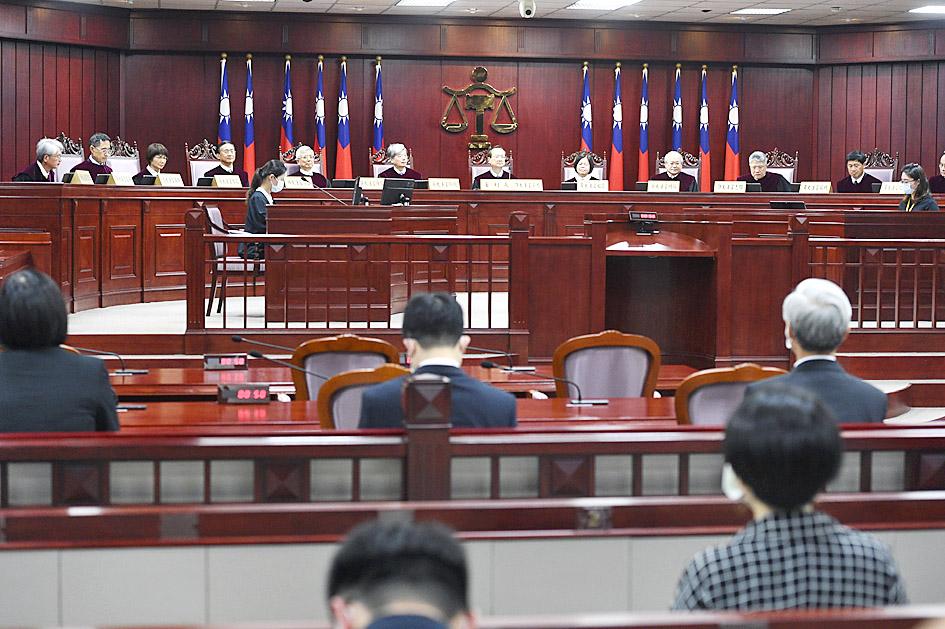Adultery was decriminalized in Taiwan yesterday after the Council of Grand Justices issued Constitutional Interpretation No. 791, declaring that Article 239 of the Criminal Code and a proviso clause for Article 239 of the Code of Criminal Procedure (刑事訴訟法) are unconstitutional and considered null and void, effective immediately.
The 15 justices issued the interpretation after hearing debate on the article, which said that both people convicted in a case of adultery face up to one year in prison, although no trial was possible without a complaint by the spouse.
The clause says that in the case of an offense specified in the Criminal Code, the withdrawal of a complaint against an accused spouse is not the same as the withdrawal of a complaint against the other party in the alleged adulterous relationship.

Photo: George Tsorng, Taipei Times
The interpretation was issued after 18 judges and a man convicted of adultery this year asked the Council of Grand Justices to overturn Interpretation No. 554, which found the Criminal Code article constitutional.
In issuing Interpretation No. 791, the council said that the Criminal Code article was a breach of sexual autonomy and the principle of proportionality, while the proviso clause violated the principle of fairness.
The Criminal Code should only be cited against acts constituting severe legal transgressions and should not be cited in cases involving marital relations, the council said.
An investigation by the state into a case of adultery, which usually occurs in private residences, could be construed as a breach of privacy, not only trampling on the core principle of sexual autonomy, but also ultimately affecting the relationship of the married couple, the grand justices said.
The Code of Criminal Procedure clause, which was put in place to encourage married couples to remain together, while still allowing proceedings against the other party to the adulterous relationship, is ineffective, as investigations sour martial relations and violate the principle of equality, the grand justices said.
Interpretation No. 791 also annuls Interpretation No. 554, they said.
The processes would begin immediately to amend the Criminal Code and the Code of Criminal Procedure, officials said.
Lawyer Huang Lu-fang (黃祿芳) said that the Criminal Code article has limited deterrent effect and abolishing the laws would not affect families.
Lawyer Cheng Yuan-hsiang (鄭遠翔) said that criminal punishment for adultery was a violation of people’s basic rights.
The article, established with the purpose of “protecting the wholesomeness of the family,” has no legitimacy nor efficacy and only becomes a weapon of revenge for the aggrieved party, Cheng said.
However, lawyer Chiu Pei-en (裘佩恩) disagreed, saying that the article was a deterrent.
With the abolition of the laws, such offenses will fall under the Civic Code, which does not offer the same deterrence that the Criminal Code does, Chiu said, adding that removing the article would lead to social chaos.
Grand Justice Wu Chen-huan (吳陳鐶) was the only justice among the 15 who opposed Interpretation No. 791.
Additional reporting by Wang Ting-chuan, Lo Chi and CNA

A magnitude 5.6 earthquake struck off the coast of Yilan County at 12:37pm today, with clear shaking felt across much of northern Taiwan. There were no immediate reports of damage. The epicenter of the quake was 16.9km east-southeast of Yilan County Hall offshore at a depth of 66.8km, Central Weather Administration (CWA) data showed. The maximum intensity registered at a 4 in Yilan County’s Nanao Township (南澳) on Taiwan’s seven-tier scale. Other parts of Yilan, as well as certain areas of Hualien County, Taipei, New Taipei City, Taoyuan, Hsinchu County, Taichung and Miaoli County, recorded intensities of 3. Residents of Yilan County and Taipei received

Taiwan has secured another breakthrough in fruit exports, with jujubes, dragon fruit and lychees approved for shipment to the EU, the Ministry of Agriculture said yesterday. The Animal and Plant Health Inspection Agency on Thursday received formal notification of the approval from the EU, the ministry said, adding that the decision was expected to expand Taiwanese fruit producers’ access to high-end European markets. Taiwan exported 126 tonnes of lychees last year, valued at US$1.48 million, with Japan accounting for 102 tonnes. Other export destinations included New Zealand, Hong Kong, the US and Australia, ministry data showed. Jujube exports totaled 103 tonnes, valued at

BIG SPENDERS: Foreign investors bought the most Taiwan equities since 2005, signaling confidence that an AI boom would continue to benefit chipmakers Taiwan Semiconductor Manufacturing Co’s (TSMC, 台積電) market capitalization swelled to US$2 trillion for the first time following a 4.25 percent rally in its American depositary receipts (ADR) overnight, putting the world’s biggest contract chipmaker sixth on the list of the world’s biggest companies by market capitalization, just behind Amazon.com Inc. The site CompaniesMarketcap.com ranked TSMC ahead of Saudi Aramco and Meta Platforms Inc. The Taiwanese company’s ADRs on Tuesday surged to US$385.75 on the New York Stock Exchange, as strong demand for artificial intelligence (AI) applications led to chip supply constraints and boost revenue growth to record-breaking levels. Each TSMC ADR represents

TRUST: The KMT said it respected the US’ timing and considerations, and hoped it would continue to honor its commitments to helping Taiwan bolster its defenses and deterrence US President Donald Trump is delaying a multibillion-dollar arms sale to Taiwan to ensure his visit to Beijing is successful, a New York Times report said. The weapons sales package has stalled in the US Department of State, the report said, citing US officials it did not identify. The White House has told agencies not to push forward ahead of Trump’s meeting with Chinese President Xi Jinping (習近平), it said. The two last month held a phone call to discuss trade and geopolitical flashpoints ahead of the summit. Xi raised the Taiwan issue and urged the US to handle arms sales to